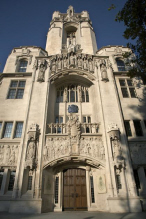Going with the flow
 Stephen Tromans QC analyses a recent Supreme Court ruling on the rights of discharge of sewerage companies.
Stephen Tromans QC analyses a recent Supreme Court ruling on the rights of discharge of sewerage companies.
The issue for the Supreme Court in The Manchester Ship Canal Company Limited v United Utilities Water plc [2014] UKSC 40 was, in the words of Lord Sumption, giving the first judgment:
“... whether a sewerage undertaker under the Water Industry Act 1991 has a statutory right to discharge surface water and treated effluent into private watercourses such as the Respondents’ canals without the consent of their owners.”
The issue arose in the context that all of the sewerage companies will historically have pipes from the sewerage system discharging into canals, drainage systems and other private watercourses.
In the absence of a statutory right of discharge, this would be a trespass unless authorised by agreement with the owner of the canal or watercourse. There are many thousands of such discharges, including not only “clean” surface water but also emergency and storm overflows of sewage.
In a case in 1897, Durrant v Branksome Urban District Council [1897] 2 Ch 291, the Court of Appeal held that a right to discharge surface water and treated effluent into private watercourses was impliedly conferred on local authorities by the Public Health Act 1875. This was very much a decision on the construction of the words used by the 1875 Act.
However, the relevant wording was not carried forward into the current statute, the Water Industry Act 1991, which was a consolidating act passed following the privatisation of the water and sewerage industry in 1989.
In 2002, the Court of Appeal in British Waterways Board v Severn Trent Water Ltd [2002] Ch 25 held that the 1991 Act contained no implied right of discharge. However, the Court in that case had not been addressed as to arguments on whether the pre-existing implied right was to be taken as having survived privatisation and consolidation in respect of pre-existing discharges. It was also argued by the sewerage company that the British Waterways case was wrongly decided.
The Supreme Court, accepting the arguments of Manchester Ship Canal Company and the Canal and River Trust (as an intervener), found that the Court of Appeal was correct in British Waterways to find there was no implied right of discharge for new outfalls under the 1991 Act. However, it rejected the argument that there was no implied right for outfalls which were in existence prior to that Act. The case is helpful authority on the strict test of necessity which governs the implication of a statutory right affecting the property of a third party. The Supreme Court did however find the basis for such implication in the continuing duty on undertakers to provide sewerage and in section 116 of the Act which restricts the ability of an undertaker to discontinue use of a sewer without providing an alternative. Lord Sumption put it this way at para. 19:
“In my opinion, when the Water Industry Act 1991 (i) imposed on the privatized sewerage undertakers duties which it could perform only by continuing for a substantial period to discharge from existing outfalls into private watercourses, (ii) at the same time applied to them the statutory restrictions in section 116 on discontinuing the use of existing sewers, it implicitly authorised the continued use of existing sewers. A restriction on discontinuing the use of an existing sewer until an alternative has been constructed is not consistent with an obligation to discontinue its use forthwith under the law of tort. The inescapable inference is that although there is no provision of the Act of 1991 from which a general right of discharge into private watercourses can be implied, those rights of discharge which had already accrued in relation to existing outfalls under previous statutory regimes survived.”
The right is however not unqualified. The Supreme Court held that it is subject to various safeguards in the 1991 Act, which include: a prohibition on contravening the Water Resources Act provisions on polluting discharges and on discharging foul water into a canal; the obligation not to create a nuisance by discharge; full compensation is payable for any damage caused; the discharge must not affect the works or property of canal or drainage undertakers; the discharge must not prejudice the exercise of undertakers’ statutory powers; and the discharge must not interfere with navigation or use of the towpath. Thus in many cases in practice the consent of a canal owner will be required, even for existing discharges, certainly if significant quantities of foul water may be discharged, or if the quantity of water discharged may be problematic in terms of the causing damage or interfering with other statutory functions.
The reasoning of Lord Sumption and Lord Neuberger PSC, who gave the main judgments, was slightly different, but both arrived at the same result. Lords Clarke and Hughes agreed with both lead judgments and Lord Toulson gave a short concurring judgment.
The Supreme Court has therefore steered a course between protecting private rights and leading to a result which it regarded as untenable, that sewerage undertakers might have lost the legal right to discharge from possibly long-established outfalls when the 1991 Act came into force, with the consequences for the sewerage system that might have entailed.
Stephen Tromans QC is a barrister at 39 Essex Street. Together with Catherine Dobson, he appeared for the Canal and River Trust, an intervener. Stephen can be contacted This email address is being protected from spambots. You need JavaScript enabled to view it..